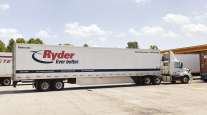Ryder Teams With Embark, Frigidaire for Autonomous Truck Test
Ryder System Inc. teamed with autonomous technology developer Embark and consumer products manufacturer Frigidaire to run a series of autonomous-driving technology tests in October, carrying Frigidaire refrigerators 650 miles at a time, the three partners said in a statement.
The pilot consisted of a single tractor and a trailer outfitted with Embark technology traveling back and forth on Interstate 10 through Texas, New Mexico, Arizona and California. A professional driver sat at the truck’s wheel during the highway segment to monitor the road and take control if necessary. The automated truck traveled as far as 306 consecutive miles in autonomous mode with the driver taking control for a mandated stop at a port of entry, according to the statement.
The partners said they chose highway driving for the autonomous test because it is more structured and addresses trucking’s critical driver shortage. I-10 was selected because it carries heavy freight volume and the sunny weather is favorable for autonomous testing, said Michael Reid, general manager of Belmont, Calif.-based Embark.
Once on the highway, autonomous systems controlled the truck for most of the driving, including construction zones, though it stayed in one lane for much of the trip, said Reid.
However, the driver did take control to guide the vehicle on the ramps on and off the highway, said Chris Nordh, Ryder’s senior director of advanced vehicle technology.
“We are still in (an early) phase. This is very much a driver assist (program) with the goal of making their jobs easier, more comfortable and safer.”
The test began at a yard in El Paso, Texas, with a Ryder driver in a standard tractor picking up a trailer filled with the refrigerators and driving it to a transition point along I-10. Once there, the driver unhooked the trailer and connected it to the Embark autonomous tractor. That truck carried the load 650 miles along I-10, handing it off to a Ryder driver at a transition point in Palm Springs, Calif., where the trailer was switched to a standard tractor. A Ryder driver then drove that tractor and load to an Electrolux distribution center in Ontario, Calif.
The Electrolux appliance company has Frigidaire as one of its many brands.
Nordh said Ryder got involved in the test because it believes that developing technology like autonomous systems will transform the trucking industry in the next 10 years.
The partners are already planning further autonomous testing, said Reid.
“The next step is to scale up on that route and prove out reliability. We will add trucks and run more miles, and (work) with Electrolux and Ryder to prove the technology works,” said Reid.
Ryder ranks No. 13 on the Transport Topics Top 100 list of the largest for-hire carriers in North America.
Embark was founded in 2016 by CEO Alex Rodrigues and Chief Technology Officer Brandon Moak. It has raised $17.2 million through three funding rounds with investors Data Collective, SV Angel, Y Combinator and Maven Ventures, according to Tech Crunch. One of Maven’s best-known investments was Cruise, an autonomous driving technology developer that was acquired by GM for $1 billion in 2016.
Embark focuses on developing autonomous driving systems for trucks on long, generally straight highways between cities. Its truck uses a combination of radars, cameras and LiDAR depth sensors to view the road. A form of artificial intelligence called Deep Neural Nets processes the data produced by the sensors, allowing the truck to learn from past experience. Products used include LiDAR systems from Velodyne and graphic processing units from Nvidia.
Embark introduced its systems in February and since then has received permission from Nevada to test its trucks on public roads.
Embark has said that its automated technology can handle less-desirable long-haul routes and bring in younger drivers to tackle the current driver shortage facing the trucking industry.
For now, autonomous technology is expensive and needs further testing, while drivers are essential for first mile-last mile control of the vehicle to perform maneuvering and other difficult tasks, said Nordh.
“Long term, this kind of technology can redeploy drivers to the jobs they actually want. It gets them home every night,” said Nordh.




